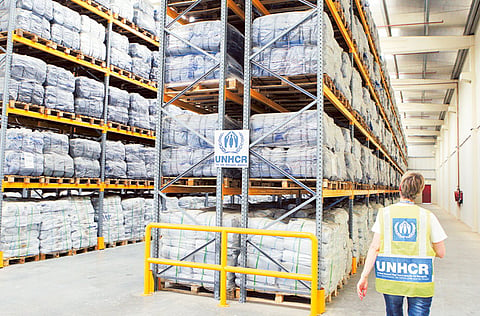UAE has largest stockpile of aid items for refugees
UNHCR official: Ramadan spirit encourages people to donate for refugees worldwide

Abu Dhabi: In a nondescript building in Dubai lie piles of tents, blankets, kitchen sets and mosquito nets. When word of a human aid crisis emerges, tons of these items are shipped out to help people in need.
This stockpile of goods, collected to aid refugees by the United Nations High Commissioner for Refugees (UNHCR), represents the largest such stockpile in the world. Located at the International Humanitarian City, the stockpile is also representative of the UAE’s extremely generous role in facilitating numerous human aid initiatives, a senior official told Gulf News in the capital recently.
“The UAE has always been a generous contributor whenever there is an emergency. And because of its advanced infrastructure, storing goods here to help refugees means that we can ship them out quickly whenever there is a necessity,” said Imran Riza, regional representative for the Gulf Cooperation Countries (GCC) at the UNHCR.
The items collected at the 20,000 square-metre Dubai storage facility, which was established in 2006, are mainly equipment that benefits refugees. Funds received from governments, the private sector and individual contributors around the world are used to purchase this equipment.
“At all times, we stock enough items at the facility to benefit 350,000 beneficiaries,” Riza explained.
Last year, 92 outgoing shipments from the facility, sent via 25 flights, were received by refugees in 38 different countries, including Pakistan, Yemen and Somalia, as well as Syrian refugees in Lebanon and Jordan.
“In the first six months of this year, we had to come to the aid of even more refugees, with 32 flights carrying goods already having been sent out in 2012,” Riza said. Many of these aid items are purchased or even produced within the UAE.
Speaking of the UAE’s role in assisting refugees, the official said that the country’s influential government can, and does, play an important role in resolving many international crises.
“The vision of the UAE leadership can inspire other nations to look for solutions when required, which in turn will allow many refugees to return to their homelands with dignity and go back to their normal lives,” he said.
Although the UNHCR does invite donations through its website, it does not run its own donation campaigns within the UAE.
”We work with local charities and organisations, such as the Red Crescent Authority, to collect the necessary funds for refugees,” the official said.
“Still, every small contribution, whether it is a financial donation or advocacy for refugees, does go a long way to give displaced peoples hope. It is important to remember that most refugees are normal people with viable lives who are displaced from their homes, through no doing of their own, because their state is unwilling or unable to offer protection. Since it is individuals who are affected by crises, help from other individuals does have a great positive impact,” he stressed.
Riza also feels that this Ramadan has seen more people in need than ever before, with refugees scattered across various African and Arab nations, as well as Myanmar.
“This month has shown us how much human need there actually exists across the globe, and fortunately, the spirit of the holy month encourages giving,” he said.



